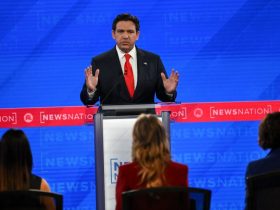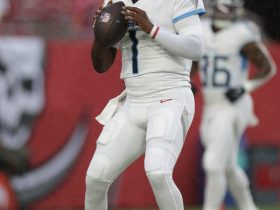The presidential campaign of Florida Gov. Ron DeSantis announced on Tuesday that it was revamping its leadership team. While such moves do not always augur a campaign’s imminent demise, the demise of political campaigns often follow such shake-ups. In recent years, nearly every presidential candidate who has shed staff in the summer before primary voting failed to win the nomination.
Perhaps DeSantis can prove to be an exception. Perhaps this shift is what is needed to redirect his efforts, to reverse the trend. The question then becomes: is such a reversal even possible?
You will recall that the year began with DeSantis posing the most substantial challenge to the candidacy of former president Donald Trump. This was part of his perceived appeal, that he was a conservative Republican unburdened by Trump’s history and controversies. If Trump won in 2016 thanks to a splintered field, the thinking went, perhaps DeSantis could be the vehicle for consolidating opposition to the former president.
That is not how it worked out. Even before Trump was indicted by a Manhattan grand jury in late March, DeSantis’s position relative to Trump had started to collapse, according to FiveThirtyEight’s average of national polls. After that indictment, related to hush money payments to a porn star, support for Trump surged.
Since that point, Trump’s position has held fairly steady. DeSantis’s, though, has fallen further. In early July, his support in the polling average fell beneath the aggregate support for other major candidates in the race.
This is a problem. Some portion of DeSantis’s pitch is rooted in his being the candidate most likely to challenge Trump. If he’s not even pulling in a majority of the support of people who picked a candidate other than Trump, that suggests that a lot of people are still shopping around for a viable non-Trump offering. There is no consolidation taking place — at least, below Trump.
At the beginning of the year, DeSantis trailed Trump in the average by a few percentage points and led the other named candidates by about 20. By the time he launched his campaign in late May, he was trailing Trump by more than 30 points and running even with the rest of the field. Now, he trails Trump by almost 40 points and trails the aggregate field of others by nearly 10 percentage points.
In case that didn’t make the point clear, DeSantis’s campaign launch did not have the intended effect. His position in the polls improved for a bit, but not much. Over the past month, the slide was steadily downward, turning around slightly only in the past week.
Presidential nominations aren’t won in national voting, of course, but the state-level picture isn’t much better. A New York Times-Siena College poll last week showed Trump leading by a wide margin in Iowa — not as wide as his national lead but a wider lead than Trump ever enjoyed in 2016. Polling in New Hampshire shows a similar pattern.
All of this brings us back to our original question: Can DeSantis turn it around? Can his new campaign team continue the upward movement he’s enjoyed over the past week — which amounts to a gain of less than a point in the polls? Can he eventually overtake Trump?
There’s an important corollary question here, of course. Can anyone?
This is an unusual primary, in which one of the candidates is someone whom most primary voters have already supported for president on at least one occasion. It is a campaign in which the leading candidate is one of the best-known politicians in American history and who has built an unusually loyal base of political support over a span of eight years. Trump’s position in the polls took a hit after the midterm elections, when his intervention in Senate races appeared to contribute to Democrats retaining control of the chamber. That, coupled with DeSantis’s wide margin of reelection, seemed as though it might hint at a shift in the primary dynamic.
But even then, DeSantis still trailed Trump. Between now and the Iowa caucuses, there’s no similar point on the calendar when Trump might compare as unfavorably with DeSantis. Many observers thought that the looming indictments of Trump might shake things loose, which hasn’t happened. So what might?
That is now a question for James Uthmeier, DeSantis’s new campaign manager. Perhaps he has an answer.
Or perhaps there is no answer.








